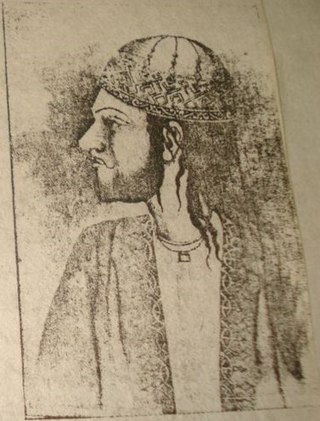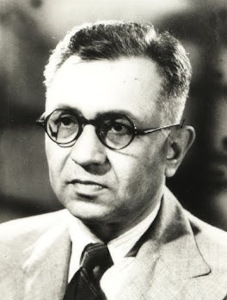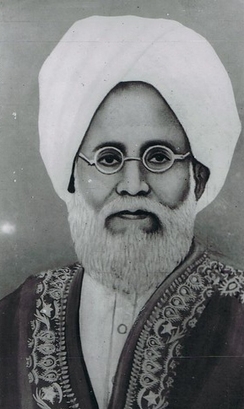Fani Badayuni | |
|---|---|
| Born | Shaukat Ali Khan 1879 Badaun, North-Western Provinces, British India |
| Died | 27 August 1961 (aged 81-82) Hyderabad, Andhra Pradesh, India |
| Occupation | Urdu poet, lawyer |
| Nationality | Indian |
| Alma mater | Aligarh Muslim University |
| Genre | Ghazal , Nazm |
Shaukat Ali Khan (1879 - 27 August 1941), better known as Fani Badayuni (his takhallus), was an Indian Urdu poet. [1] [2]
He was schooled at Government High School and graduated from Bareilly College in 1901, studied law at Aligarh Muslim University, earning L.L.B. degree in 1906. [3] [4]
Badayuni started composing poetry around Eleven years of age. [5] [6]
Fani migrated to Hyderabad, India after the Nizam's diwan Maharaja Kishan Prasad 'Shad', an Urdu lover and poet, got Fani appointed in the department of education. [7] [8]
His first collection of poems was published in 1917 from Badaun by Naqib Press. His other published works are: [9]

Mir Babar Ali Anees, also known as Mir Anees was an Indian Urdu poet. He used his pen-name (takhallus) of Anees in poetry. Anees used Persian, Urdu, Arabic, and Sanskrit words in his poetry. Anis wrote prolonged Marsias, which was a custom of his times, but nowadays only selected sections are narrated even in religious ceremonies. He died in 1291 Hijra, corresponding with 1874 CE.
In Persian, Turkic, Hindustani and Punjabi, the word takhallus means a pen name. Pen names were widely adopted by Persian, Turkic, Urdu and Punjabi poets.

Asrar-ul-Haq, better known as Majaz Lakhnawi, was an Indian Urdu poet. He is known for his romantic and revolutionary poetry. He composed ghazals and nazms in Urdu. He was the maternal uncle of poet and screenplay writer Javed Akhtar and Indian-American psychoanalyst Salman Akhtar.

Momin Khan Momin was a late Mughal era poet known for his Urdu ghazals. A lesser-known contemporary of Ghalib and Zauq, he used "Momin" as his pen name. His grave is located in the Mehdiyan cemetery in Maulana Azad Medical College, Delhi.
The Progressive Writers' Association or the Progressive Writers' Movement of India or Anjuman Tarraqi Pasand Mussanafin-e-Hind or Akhil Bhartiya Pragatishil Lekhak Sangh was a progressive literary movement in pre-partition British India. Some branches of this writers' group existed around the world besides in India and Pakistan

Hyderabadi Muslims, also referred to as Hyderabadis, are a community of Deccani people, from the area that used to be the princely state of Hyderabad in the regions of Marathwada, Telangana, and Kalyana-Karnataka.

Anjuman-i Taraqqi-i Urdu was an organisation working for the promotion and dissemination of Urdu language, literature and culture in British India.
Akhtar Sheerani was an Urdu poet. He was a romantic poet of the Urdu language.

Khwaja Haider Ali Aatish (1764 –1846) of Lucknow was an Urdu poet. Khwaja Haider Ali Aatish Lakhnawi is one of the giants of Urdu literature. Aatish and Imam Baksh Nasikh were contemporary poets whose rivalry is well known. Both had hundreds of disciples. The era of Aatish-Nasikh was a golden era for Urdu poetry in Lucknow. Aatish is mostly known for his ghazals, and for his amazing and different style of poetry.
Sulaiman Areeb was an Indian poet from Aurangabad.
Akhlaq Mohammad Khan, better known by his takhallusShahryar, was an Indian academic, and a doyen of Urdu poetry in India. As a Hindi film lyricist, he is best known for his lyrics in Gaman (1978) and Umrao Jaan (1981) directed by Muzaffar Ali. He retired as the head of the Urdu Department at the Aligarh Muslim University, and thereafter he remained sought after name in mushairas or poetic gatherings, and also co-edited the literary magazine Sher-o-Hikmat.

Mah Laqa Bai, born Chanda Bai, and sometimes referred to as Mah Laqa Chanda, was an Indian 18th century Urdu poet, courtesan (tawaif) and philanthropist based in Hyderabad. In 1824, she became the first female poet to have a diwan of her work, a compilation of Urdu Ghazals named Gulzar-e-Mahlaqa, published posthumously. She lived in a period when Dakhini was making its transition into the highly Persianized Urdu. Her literary contributions provide insight into such linguistic transformations in southern India.

Amjad Hyderabadi Birth name Syed Ahmed Hussain(Urdu: سيد احمد حسين; 1888–1961), better known by the pen-name Amjad Hyderabadi, was an Urdu and Persian Ruba'i poet from Hyderabad, India. In Urdu poetic circles he is also known as Hakim-al-Shuara.
Mallepally is located near Asifnagar in Hyderabad, India. It is a locality in Hyderabad District and one of the old suburbs that have existed for a long while now. It is one of the oldest localities to exist in the history of Hyderabad during the time of Nizams.

Syed Imtiaz Ali Taj was a Pakistani dramatist who wrote in the Urdu language. He is best known for his 1922 play Anarkali, based on the life of Anarkali, that was staged hundreds of times and was adapted for feature films in India and Pakistan, including the Indian film Mughal-e-Azam (1960).
The Aligarh Movement was the push to establish a modern system of Western-style scientific education for the Muslim population of British India, during the later decades of the 19th century. The movement's name derives from the fact that its core and origins lay in the city of Aligarh in Central India and, in particular, with the foundation of the Muhammadan Anglo-Oriental College in 1875. The founder of the oriental college, and the other educational institutions that developed from it, was Sir Syed Ahmed Khan. He became the leading light of the wider Aligarh Movement.

Abd al-Ḥāmid al-Qādirī al-Badāyūnī, also known as Mujahid-e-Millat, was a Pakistani Islamic scholar, Sufi, poet, and leader from Pakistan. He was the founder of the Islamic college Jamia-Talimat-e-Islamiya located in Karachi.

This bibliography of Shibli Nomani is a selected list of generally available scholarly resources related to Shibli Nomani, a poet, philosopher, historian, educational thinker, author, orator, reformer, critic of orientalists and Islamic scholar from the Indian subcontinent during the British Raj, regarded as the father of Urdu historiography. His disciple Sulaiman Nadvi wrote his biography, Hayat-e-Shibli, in 1943. This list will include his biographies, theses written on him and articles published about him in various journals, newspapers, encyclopedias, seminars, websites, etcetera in APA style.
Maulvi Syed Mohammad Abdul Ghafoor Shahbaz (1857–1908) was an Indian Poet, Translator and Researcher of Urdu-language. He had his research on Kulliyat-e-Nazeer of Nazeer Akbarabadi. He had served as a professor at Aurangabad College and also the first Director of Public Instruction, Bhopal in 1905. He was the founder and editor of Noor-e-Baseerat, a monthly literary magazine published from Bengal since its foundation in July 1884. He had also contributed to Darus Saltanat and Lucknow Awadh Panch, a satirical magazine.

Shah Akbar Danapuri (1844–1914) also known as Shah Muhammad Akbar Abulolai Danapuri was an Indian Islamic scholar, writer and Sufi poet. He belonged to the Naqshbandi Abulolaiya order of Sufism. He was contemporary of Imam Ahmed Raza Khan Barelvi and Waris Ali Shah. He had served as the Sajjadanasheen of Khanqah Sajjadiya-Abulolaiya from 1884 to 1914. He was a student of Waheed Allahabadi, a disciple of Khwaja Haidar Ali Atish. He was the teacher of Zohra Bai.